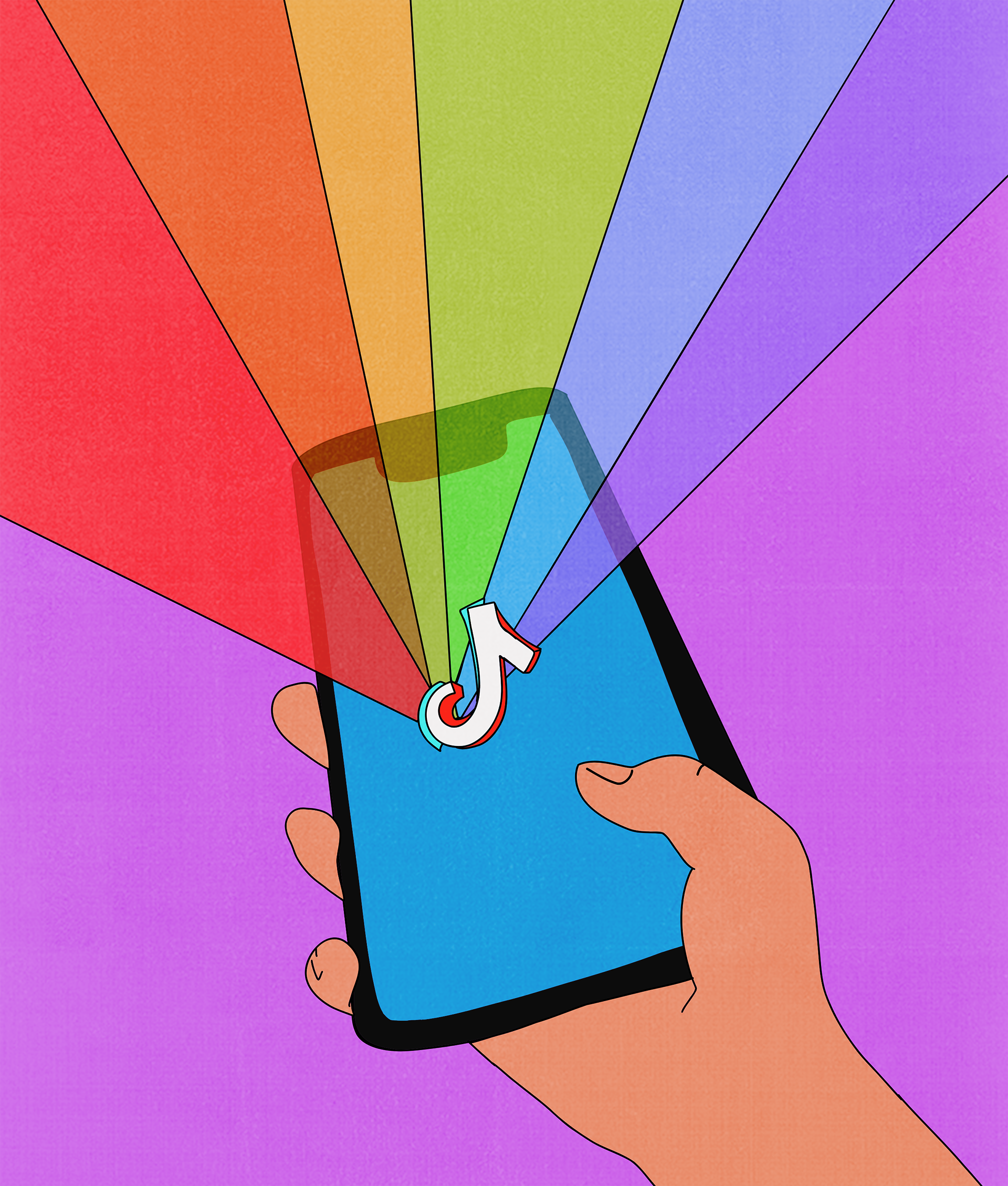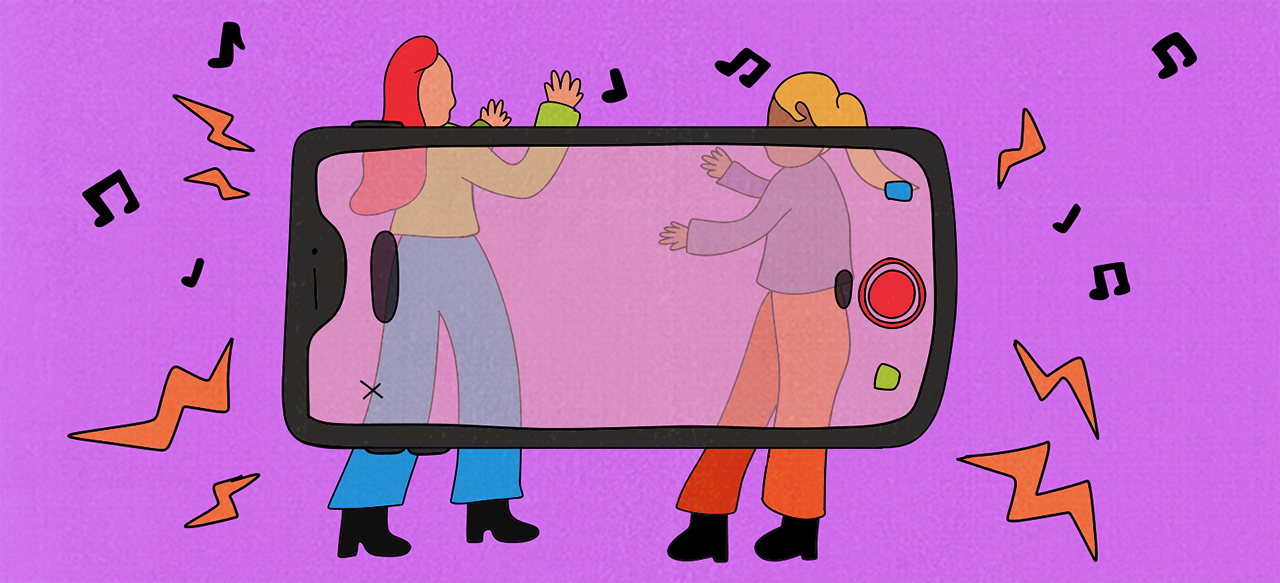When the video-sharing app TikTok first launched in 2016, it didn't seem like anything special. Most teens used it to share short, synchronized dancing videos. But when the coronavirus pandemic shattered social norms, forcing endless days of monotony and fracturing social interactions, the app rose in popularity. Users turned to TikTok for a sense of community and connection, and some, like queer creator Gracie McGovern, found it.
"At 20, it's a bit late in life to be coming out and questioning your gender identity," McGovern explains. "The fact that I was able to connect with so many people who were going through the same exact things gave me a lot of comfort and a lot of confidence."
TikTok has opened up a new online community space for queer teens, providing a platform for LGBTQ Gen Z'ers to be themselves, to connect with each other, and to discuss current issues for the community. And as the queer population of younger generations grows — one in six Gen Z adults identified as LGBT in a 2021 poll conducted by Gallup — TikTok has become a way to assert their identities.
McGovern, now 21, first downloaded the app in early 2020, before COVID spread to the U.S. She didn't start posting videos until later, when they began posting daily news recaps that went viral, sometimes gaining hundreds of thousands of views. They now have amassed a following of over 46,000.
They began making friends on TikTok, commenting on others' videos and forming connections. Although she engages in queer discourse on other social media apps like Twitter and Instagram, TikTok feels more intimate, she says.
"It connects you to so many people on a more individual basis," McGovern says. "I have a lot of friends where we literally just popped up on each other's For You Pages and then started talking."
Shaun Ferren, another 21-year-old queer creator, also connected to the LGBTQ community through TikTok, particularly during the pandemic. Ferren, whose dancing videos sometimes reach millions of views, forges connections on the app simply by commenting on others' videos.
"At first, I would only follow super big people that I thought were funny and I wanted to consistently see their videos, but then after a while I was like, wait, I like this person's style or I like this person's aesthetic," Ferren explains. "Sometimes I'll just comment and hope that my comment stands out. And I've made a lot of friends from that, which sounds kind of odd, but like, that's the way of the world now."
According to Gallup's February poll, nearly 16% of Gen Z identifies as LGBT — the highest percentage of any generation. Millennials follow with 9%, and Gen X trails with nearly 4%. As the generations get older, the percentage of queer individuals within that generation decreases.
This doesn't necessarily mean there are more LGBTQ people in Gen Z, says Michael Bronski, Harvard professor of the practice in media and activism and studies of women, gender, and sexuality. It simply means younger generations are more comfortable coming out, and responding accurately to identity-based surveys.
"We wouldn't have seen numbers like this before because it was always harder to come out before," Bronski said. "It's inconceivable that you'd have Ru Paul's Drag Race or Pose on TV in the 80s. We have a cultural framework that we just didn't have before."
As queer culture has shifted to a largely online space — particularly as societies became more and more isolated during 2020's quarantines — TikTok has emerged as an avenue for LGBTQ creators to share stories and openly be themselves.
And TikTok seems uniquely suited to enhance communities. The app's For You Page curates through a recommendation system that accounts for user details, like how long a user watches a video, if they scroll through comments, or if they like videos with similar hashtags. The algorithm is also notorious for frequently populating the videos of smaller creators on For You Pages, which not only diversifies feeds, but also allows videos by users with few followers to become viral, fast.
For Ferren, the For You Page feels like a "safe zone" because it's so intensely curated. It helped Ferren feel more comfortable with their identity simply because they were exposed to other queer individuals who expressed their identities openly.
"I've definitely gone through a lot of changes in myself over the past year that were influenced by TikTok — whether that's just stylistically, or [from] information I've learned about the queer community," Ferren says. "Only within the past year, I have come out as non-binary and I feel comfortable being public about that because everyone puts their pronouns in their bios now. And I feel like that kind of started being more normalized on TikTok."
Although TikTok emerged as a supplementary online connector throughout the pandemic, Bronski says it shouldn't turn into a substitute for real-life interactions.
"The real social, cultural, and political change happens when people get together in person," Bronski explains. "COVID presented a huge problem for everyone, but particularly for queer people, because queer communities are more fragile; queer people have a whole other set of boundaries."
McGovern agrees.
"We should take this energy that people have seen from connecting with so many other queer people and move toward community-building and organizing," they say.
Ultimately, the app isn't a replacement for in-person community spaces. But it did provide a new kind of space and support for LGBTQ communities throughout the pandemic — and helped several Gen Z'ers come to terms with their identities.
"It feels like a safer place to be myself," Ferren says. "Scrolling through videos and seeing how my style has changed inspires me to only keep growing and, looking back, I'm like, wow. I can see how much I've gone through and I can see a stronger sense of confidence in myself. Right now, I'm more confident in the fact that I'm just myself."


